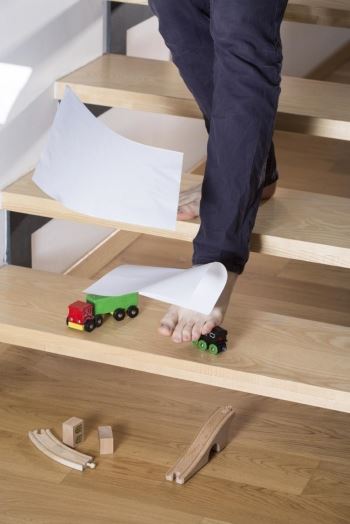Imagine ordering a new pair of shoes online. The UPS driver arrives three
days later, drops your box off on your porch, and returns to his truck.
But on the way back, the driver trips and falls on a loose step, breaking his leg. Did you know you might just have a lawsuit on your hands?
Premises Liability Extends To Private Property, Too
Premises liability is a concept that means all visitors to your property have the right to be safe from accidents and harm (the right of ordinary care).
This right extends both to people at your home for social reasons (friends, family, neighbors; also called licensees) and those invited onto your property, such as mail carriers and landscapers—referred to as invitees.
When ordinary care is lacking, the victim may be entitled to damages for emotional distress, healthcare and loss of wages.
For example, failing to clean up spilled oil in your driveway that causes your mail carrier to slip and fall could make you liable.
Likewise, holding a neighborhood BBQ that causes half the street to come down with food poisoning could make your legally responsible.
In general, if your negligence directly contributes to someone else being injured on your property, you can be held responsible.
Building a Case
If you've been injured while visiting a neighbor's, friend's or client's home, you need evidence to build a case.
And yes, it can be awkward bringing up legal matters with people you might be close to, but failing to bring about a premises liability case in a timely manner could mean you're the one stuck with hospital and prescription fees.
Make sure to take pictures or videos of the site where you were injured (and your injury) with your phone. Most phones allow for time and location stamps on pictures, making it crystal clear exactly where and when your accident happened.
Ask any witnesses to write down (in detail) what they saw and heard regarding your accident. Statements from witnesses aren't always possible to obtain, but they can be crucial if the homeowner won't cooperate with you.
Keep copies of all medical records related to the injury. Remember, your case rests on forming a direct link from the homeowner's negligence to your specific accident, and medical records are essential.
At the same time, you should be getting in touch with the homeowner's insurance company in order to file a claim.
Who's to Blame?
A handful of states—Virginia and North Carolina among them—take a different stance on premises liability when the injured person is even partially responsible for their accident
In most of the country, the injured are entitled to a percentage of their claim's total compensation based on your level of blame—meaning if you continue to use your friend's slippery basement entrance after they repeatedly tell you to use their front door (and you fall), you may not be reimbursed for all of your medical bills.
In Virginia and North Carolina, you aren't eligible for any compensation if you're partially at fault...so keep that in mind next time you decide to take up burgling as

